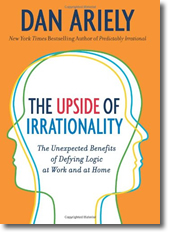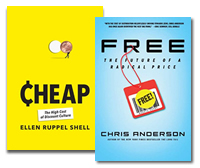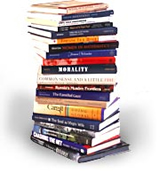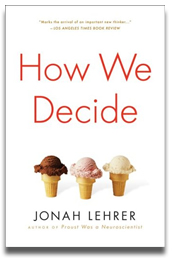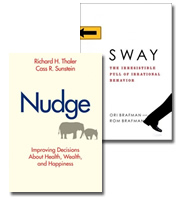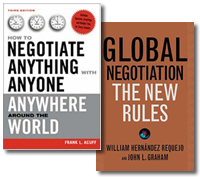Neuroscience, Psychology, & Decision-Making
Monday, January 30th, 2012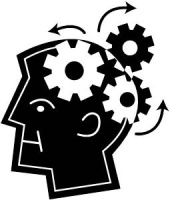
When Dan Ariely published his second book, The Upside of Irrationality, I received an announcement on email about a book signing in Geneen Auditorium. Students and faculty from throughout the campus packed the giant room and listened with careful attention as Dan described his experiments with decision making that illustrated how expectations and emotions skew our reasoning abilities. While everyone knew Dan as an excellent story teller, the audience also came from all corners of the university because they were intensely interested in how their minds really functioned.
In recent months, the New York Times has listed several best sellers, written by neuroscientists, psychologists and journalists, which are relevant to faculty and students in many fields including decision making, leadership and marketing. Below is a list of the Ford Library’s newest books on the topic. Other titles are on exhibit in the display window at the entrance to the Ford Library and in another book display in the Economics section within the library.
Thinking, fast and slow by Daniel Kahneman
Explores two types of decision making, intuitive and deliberate (fast and slow) that underlie our irrational choices and contradictory thinking. Recommended for fans of Dan Ariely’s Predictably Irrational.
The Mind’s Eye by Oliver Sacks
Presents six case histories of people who lost a key visual ability, such as how to recognize familiar faces or to read simple words, and describes the ways their brains compensated to enable them to live fulfilled lives.
Incognito by David Eagleman
Explains that human brains are composed of a complex array of pieces and parts, most of which we have no access to, and shows how we are influenced profoundly by unconscious drives of which we are unaware.
You are not so smart by David McRaney
Illustrates that humans are prone to think in certain ways and not others, by using 48 cases of self-delusion caused by cognitive biases and logical fallacies. Easy and fun read.
Now you see it by Cathy N. Davidson
Analyzes familiar patterns of attention, suggesting new ways to see and learn that work best for education and the workplace in the digital age. Author is former Vice Provost at Duke.
The tell-tale brain by V. S. Ramachandran
Uses the bizarre symptoms seen in the author’s neurology patients to unravel the connections between the brain, mind and body.
Self comes to mind by Antonio Damasio
Takes an evolutionary perspective on the relationships among brain, mind and self, exploring consciousness, what it is and how it is created. Recommended for readers with backgrounds in science and philosophy.
© Reviewer: Meg Trauner & Ford Library – Fuqua School of Business.
All rights reserved.

